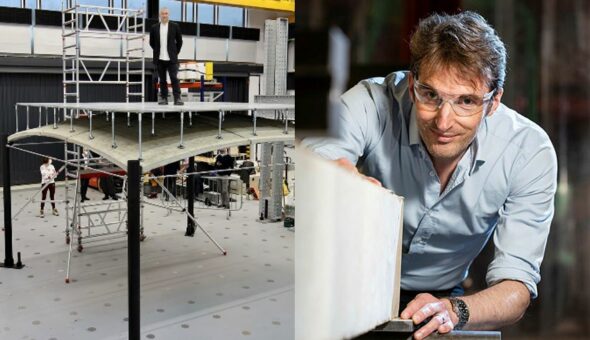Peter Phelps (UoB Climate Action Project Lead), Sarah Hainsworth (UoB PVC-R), Sophie Broadfield (BANES, Director of Sustainable Communities), Councillor Sarah Warren (BANES), Councillor Oli Henman (BANES)
On the 16th October we hosted a joint policy research workshop with Bath and North-East Somerset (BANES) Council to discuss our shared interests in environmental sustainability, and to discuss how we can work together in this area.
The event was attended by academics from across all 3 University of Bath Faculties and the School of Management, and we were delighted to welcome council officers from across many different teams in BANES, as well as Councillors Sarah Warren and Oli Henman.
The event began with a very useful introduction to the Council’s structure and priorities, its corporate strategy, and how it approaches collaborative working, delivered by Sophie Broadfield (Director of Sustainable Communities). Sophie also noted how BANES strategy and activities are now being informed by the ‘doughnut’ approach, which focuses on ensuring that priorities are delivered within the capacity of our climate, ecology and environment. Find out more about how BANES are using the doughnut approach here.
This was followed by a presentation from Katrina Kelly (Head of Community Engagement, UoB) discussing how our two organisations can best work together. Katrina highlighted that four different ways of working across our two institutions had been identified as part of the ‘Our Shared Future project’, an initiative launched in January 2020, bringing together skills, knowledge and expertise to explore and address major challenges in the City and region.
These four ways of working are:
- Collaborative, funded research – where relationships are built over time, allowing for quick action when external funding becomes available
- Acting as a ‘Critical friend’- activities such as looking over documents or giving early expert opinion and input to policy development, holding each other accountable, working together on events and activities, or sharing resources and knowledge.
- Activating the student body – through student placements, work experience and Vertically Integrated Projects.
- Consultancy - This is paid work arranged between the Council and an individual academic.
With the potential ways of working set out, and the principals of doughnut economics in mind, we then broke out into smaller groups to discuss five policy areas identified as key challenges for BANES:
- Retrofit
- Monitoring of the local natural environment
- The circular economy
- Behaviour change and sustainable transport
- Climate adaptation.
There were lively discussions, as BANES colleagues highlighted their challenges and potential opportunities and our researchers shared how their expertise could be used to overcome and address some of these issues. A great deal of synergy was demonstrated between our academic strengths and the council’s objectives, and we came away from the session with a sense of optimism regarding what could be achieved through our collaboration.
Lots of potential project ideas and topics for follow up conversations were identified during the session and our team are now working through the many post-its and jotted down notes to identify opportunities to work together, secure funding or share existing research.
We intend to hold a follow up workshop in six months, however in the meantime there will be a number of working groups set up to explore specific issues in greater detail. If you have an interest in any of the five subjects outlined above, please do get in touch with Katrina Kelly (kj272@bath.ac.uk) and we’ll ensure you are involved in relevant discussions.
Kind regards,
Sarah



